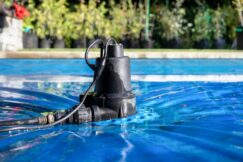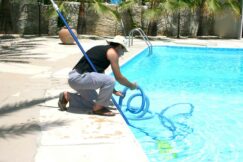A pool can add much joy to any home, but it also requires maintenance and renovations. To make sure your pool renovation doesn’t become a disaster, plan carefully, pay attention to detail, and adhere to the following tips.
- Assess the condition of your pool first. Figure out what needs to be replaced or mended, like broken tiles or non-functional equipment. This assessment helps decide tasks and use resources efficiently.
- Seek professional help. Hire an experienced pool contractor to execute the project professionally, abiding by local laws. Professionals know how to handle complex renovations and avoid errors.
- Choose materials and design elements for your renovated pool wisely. Research different options, like durable products that can withstand tough weather and frequent use. Add modern features like energy-efficient pumps or automation systems to boost both functionality and looks.
- Design a realistic budget for the renovation. Think about the cost of materials and labor, plus any additional costs that may arise. Have contingency funds too, to deal with unexpected events without ruining the budget.
- Keep in touch with the contractor. Follow the progress, talk about any changes or worries quickly, and address issues before they get worse. This helps both parties understand each other and reduces delays.
- Don’t forget maintenance once the renovation is done. Clean regularly, monitor water quality, and repair on time to maintain your renovated pool.
By following these tips – assessing the pool, seeking professionals, choosing materials and design, creating a budget, communicating with the contractor, and prioritizing maintenance – you’ll be able to renovate your pool without disaster. Enjoy the transformed oasis!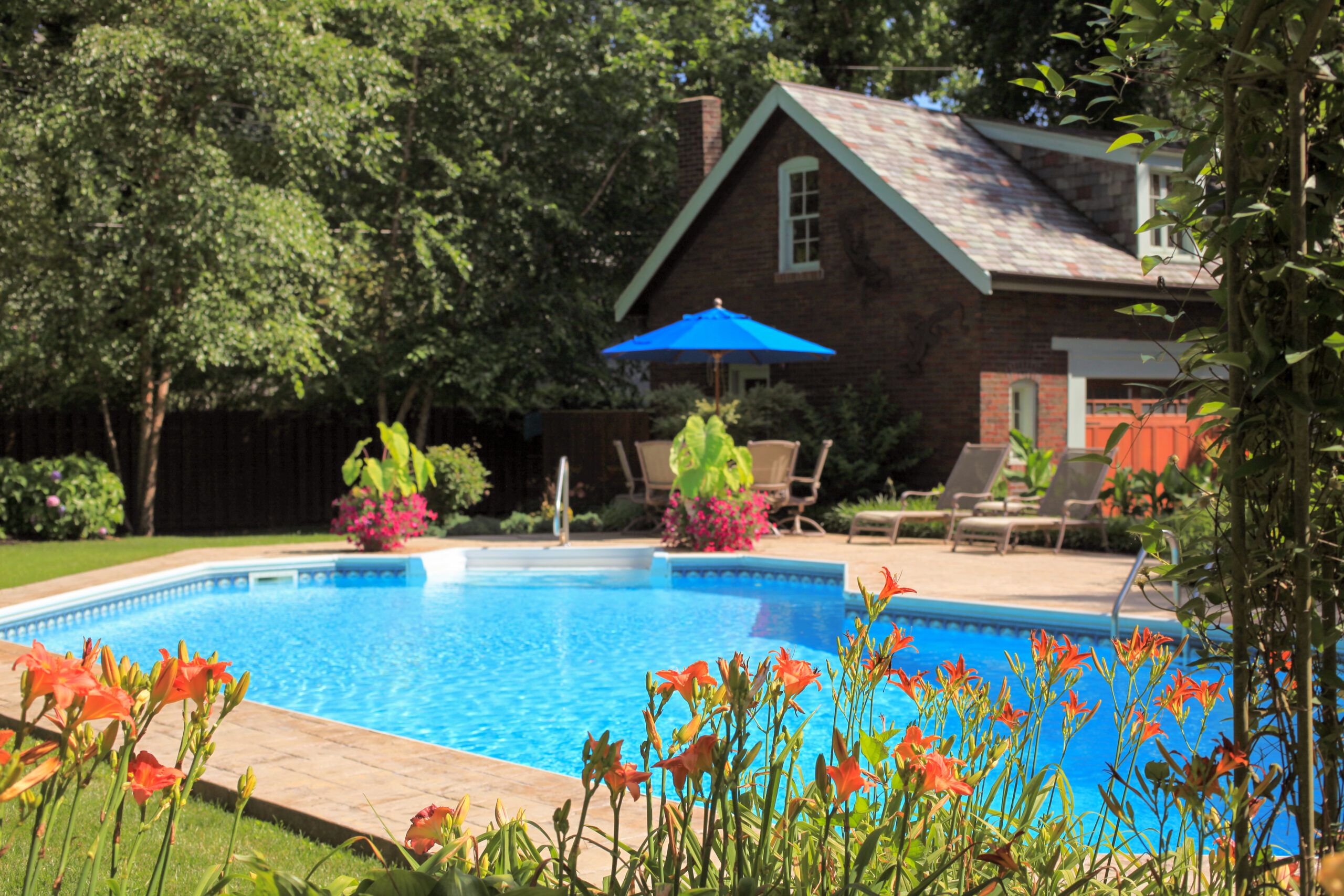
Assessing the Current Condition of Your Pool
Assessing the Current State of Your Pool:
To assess the current condition of your pool, follow these 3 simple steps:
- Visual Inspection: Look for any visible cracks, leaks, or signs of wear and tear on the pool’s surface, tiles, and deck. Check if the water level is consistent and identify any discoloration or algae growth.
- Equipment Evaluation: Examine the pool’s filtration system, pumps, and valves to ensure they are functioning properly. Test the water quality by using a pool testing kit to check pH levels, chlorine content, and overall chemical balance.
- Structural Analysis: If necessary, hire a professional to conduct a structural assessment to identify any underlying issues such as leaks in the pipes or structural damage. This will help you determine if any repairs or renovations are needed.
For a successful pool renovation, it is important to thoroughly assess the current condition of your pool. Remember to consult with experts and follow local regulations to ensure a smooth renovation process.
Pro Tip: Consider hiring a licensed contractor who specializes in pool renovations to ensure the best results and avoid any potential complications.
Remember, inspecting the pool structure isn’t just about finding flaws, it’s also a great way to relive your childhood dreams of being a detective—cue the dramatic music!
Inspecting the Pool Structure
Let’s take a closer look at the components involved in inspecting a pool:
- Foundation: Check for any cracks or settling in the concrete base.
- Walls: Look for signs of deterioration or leaks.
- Floor: Examine for any uneven or damaged areas.
- Drainage System: Assess the functionality of drains and pipes.
But that’s not all! Important elements such as skimmers, return fittings, and main drains also need to be inspected. These components are vital for maintaining clean water and circulation. Plus, pay attention to sealants around lights and fittings to prevent water leakage issues.
Regular inspection and maintenance will help keep your pool in good shape and create a safer environment for swimming. Fun fact: Did you know that the British Standards Institution (BSI) has guidelines for pool inspections? These standards provide comprehensive guidelines for maintaining safe conditions in swimming pools.
Checking for Leaks or Plumbing Issues
Inspecting your pool is key for proper functioning and its longevity. Here are some points to consider:
- Examine the pump, filter, and heater for signs of leaks, like water stains or wet spots.
- Check plumbing pipes for cracks or loose connections that may cause leaks.
- Look for visible cracks or damage on the inside and outside of the pool.
- Mark the water level around the pool, then check after 24 hours. A drop could mean a leak.
- Put food coloring in skimmer baskets or returns. See if the dye gets pulled in by any cracks.
Even a small leak can lead to major water loss. Taking care of leaks soon will save money and prevent damage to your pool. So, inspect for leaks and plumbing issues regularly.
Fun fact: The Environmental Protection Agency (EPA) states that fixing household leaks saves homeowners 10% on water bills.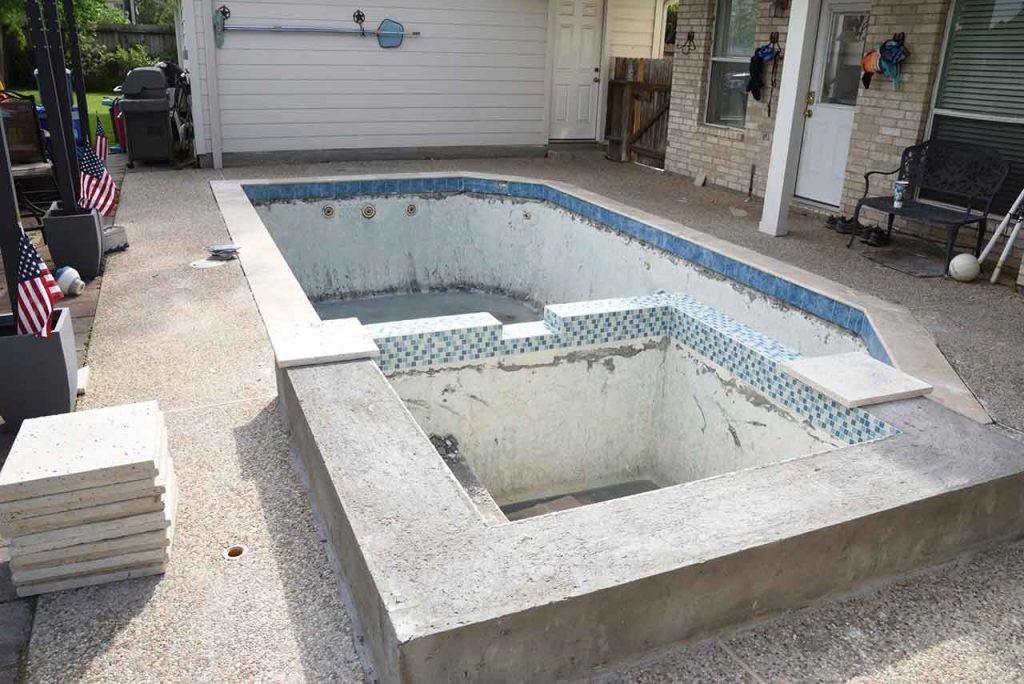
Setting a Budget for Your Pool Renovation
Setting a Financial Plan for Your Pool Remodeling
To ensure a smooth and successful pool renovation, it is essential to establish a financial plan that aligns with your goals and resources. Here are three key points to consider:
- Assess Your Priorities: Begin by identifying your desired renovations and their significance to you. Determine which aspects are essential and those that can be compromised or delayed.
- Estimate Costs: Get accurate quotes from reputable contractors for the proposed renovations. Consider potential additional expenses for unforeseen repairs or upgrades that may arise during the process.
- Allocate Contingency Funds: It is wise to set aside a buffer amount beyond the estimated costs. This safety net will protect you against unexpected price variations, ensuring you can handle any unforeseen problems without straining your budget.
Furthermore, it is crucial to stay informed about any unique details associated with your specific renovation project. This will help you make well-informed decisions and avoid any surprises or setbacks.
To ensure a successful pool renovation, consider the following suggestions:
- Research and Compare: Take the time to research and gather multiple quotes from different contractors. Compare their expertise, credentials, and recommendations to ensure you choose the most reliable and suitable contractor for your project.
- Seek Professional Advice: Consult with a pool renovation specialist who can guide you through the process and provide expert insights. Their recommendations will help you make informed choices and ensure that your budget is allocated effectively.
- Regular Communication: Maintain open and clear communication with your contractor throughout the renovation process. This will enable you to address any concerns promptly and avoid potential budgetary deviations.
Implementing these suggestions will not only help you stick to your budget but also provide a smooth renovation experience. By setting proper financial plans and considering professional advice, you can confidently embark on your pool renovation journey.
Researching costs of materials and labor may feel like swimming in murky waters, but don’t worry, we won’t leave you drowning in financial regret.
Researching Costs of Materials and Labor
Researching materials and labor costs is essential when setting a budget for your pool renovation. It gives you accurate information on expenses, and helps you make informed decisions. Here’s a table with average prices for materials and labor:
| Materials | Average Cost |
| Pool Tiles | $4 – $15/sqft |
| Pool Resurfacing | $5,000 – $10,000 |
| Pool Equipment | $500 – $5,000 |
| Lighting | $200 – $1,000 |
| Pool Decking | $6 – $12/sqft |
Conducting research can help you avoid unexpected costs. Consider the size of your pool and any additional features or upgrades. These details can affect the overall cost.
Pro Tip: Get quotes from multiple contractors and suppliers. This will let you compare prices and choose the best options that fit your budget while ensuring quality workmanship.
Prioritizing Renovation Tasks Based on Budget
Considering your budget when renovating your pool is key. Here are five points to think of to make the most of your money:
- Check the essentials: Make sure any urgent repairs are done, so your pool is safe and functioning.
- Think of aesthetics: New tiles, lighting or decking can make a big difference in the appearance of your pool.
- Replace equipment: Invest in new filters, pumps, heaters and automation to save money in the long run.
- Extra features: If you can afford it, consider adding waterfalls, fountains or a spa for more luxury.
- Landscaping: Proper landscaping can create a cohesive look and provide privacy and shade.
Consult experts to get advice tailored to your budget. Prioritizing the right tasks will help you get the best outcome.
Pro Tip: Get multiple quotes from vendors to get the best value for your money.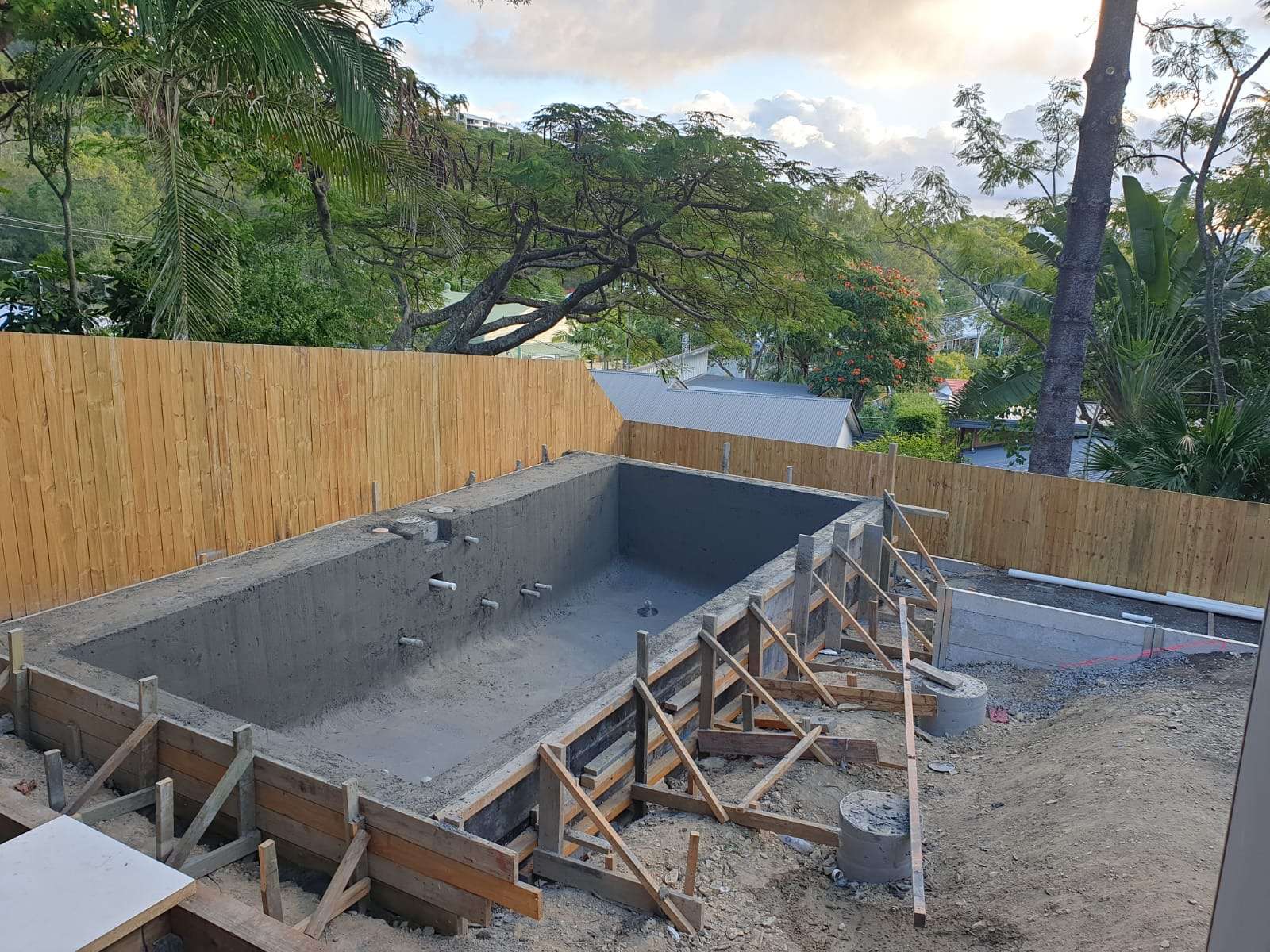
Finding a Reliable Pool Renovation Contractor
Finding a Trustworthy Pool Renovation Expert
When it comes to revamping your pool, finding a reliable contractor is paramount. To ensure a successful renovation, take note of the following points:
- Look for Reviews and Testimonials: Check online platforms and local directories for customer reviews and testimonials regarding pool renovation contractors. This will help you gauge the reliability and quality of their work.
- Verify Credentials and Experience: Ensure that the pool renovation contractor you choose is properly licensed and certified. Additionally, consider their experience in the industry and look for any specialized expertise they may possess.
- Request and Compare Quotes: Obtaining multiple quotes from different contractors is crucial. This allows you to compare prices, services offered, and timelines, helping you make an informed decision.
Additionally, consider discussing your specific requirements and expectations with potential contractors to determine if they align with their capabilities.
To ensure a successful pool renovation project, it is vital to find a reliable contractor who can deliver high-quality results within your budget and timeline.
Don’t miss out on transforming your pool into a stunning oasis. Take the necessary steps to find a trustworthy pool renovation expert today and give your pool the upgrade it deserves.
Before hiring a contractor, make sure they’ve never been involved in a pool disaster – you don’t want to end up with a water feature that’s better suited for a haunted house.
Researching Local Contractors
- Take advice from family and friends who recently renovated their pool.
- Check out online reviews and social media groups to get ratings of local contractors.
- Confirm they hold licenses and certifications for pool renovations.
- Ask to see a portfolio of past projects to check their skill level.
- Research is key! Don’t put off finding the best contractor for your dream pool renovation.
- Get in touch with potential contractors now.
- Ask questions, schedule consultations and get detailed quotes.
- Don’t wait, make your dream pool a reality!
Checking References and Reviews
- Contact the contractor’s references. Talking to them can provide a direct report of their experiences with the contractor. Ask questions about the quality of work, time-keeping, communications, and professionalism.
- Moreover, look for reviews on trustworthy websites. People can use these platforms to share their experiences and give feedback on the contractor’s services.
- Be aware of recurring positive/negative comments in reviews. This can help you recognize any strengths/weaknesses the contractor has.
- Also, ask your social network about contractors they’ve worked with in the past. Make your decision based on references and reviews that fit your expectations.
- In addition, check licenses, insurance coverage, and expertise. Evaluating all these aspects will make sure you pick a reliable professional who can deliver amazing results.
- Remember to ask references if they’d hire the contractor again. This question can provide valuable insight into their level of satisfaction.
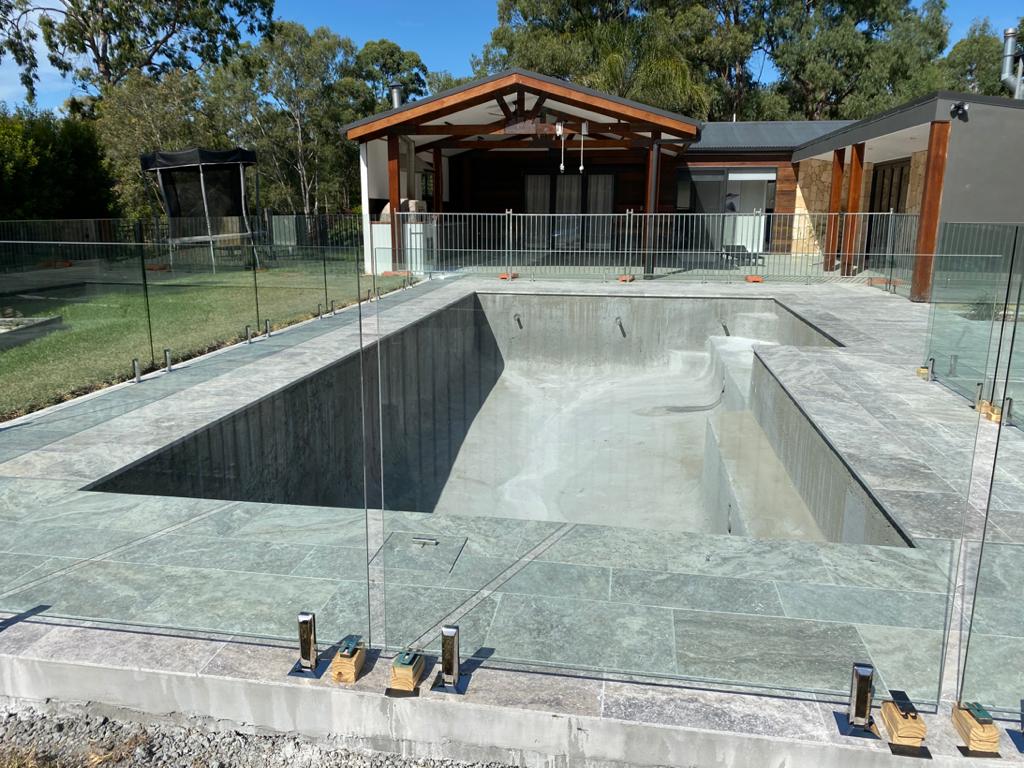
Planning the Pool Renovation Process
Planning the Pool Renovation Process requires careful consideration and organization to ensure a successful outcome. It involves analyzing the existing pool condition, setting a budget, creating a timeline, and determining the desired renovations. By following a systematic approach, homeowners can avoid costly mistakes and delays.
| Step 1 | Analyze Pool Condition | Assess the current state of the pool, including its structure, plumbing, and electrical systems, to identify any areas that require repair or replacement. |
| Step 2 | Set Budget | Determine how much you are willing to spend on the renovation project, considering the desired improvements and any unforeseen expenses that may arise. |
| Step 3 | Create Timeline | Establish a realistic schedule for the renovation, taking into account factors such as weather conditions, availability of contractors, and the complexity of the desired renovations. |
| Step 4 | Define Renovations | Clearly define the scope of the renovations you wish to undertake, whether it’s updating the pool’s design, adding new features, or improving its functionality. |
While planning the pool renovation process, it is essential to consider unique details that can impact the project’s success. Factors such as obtaining necessary permits, selecting a reputable contractor, and considering eco-friendly options should be thoroughly examined.
To ensure a smooth renovation, here are some suggestions:
- Research and hire a qualified pool contractor who has experience in pool renovations. They can provide expert advice, oversee the project, and ensure that all work is done to code.
- Allocate a contingency budget to account for unexpected expenses that may arise during the renovation process. This will help prevent financial difficulties and potential project delays.
- Communicate clearly with the contractor about your expectations and desired outcomes. Regular updates and open lines of communication can help address any concerns promptly and ensure that the renovation stays on track.
By following these suggestions, homeowners can effectively plan their pool renovation process and minimize the likelihood of any setbacks or disasters.
Creating a timeline and schedule for your pool renovation will ensure that the only thing drowning in chaos is your ex’s dating prospects.
Creating a Timeline and Schedule
Start by figuring out what renovation you need for your pool. Figure out which tasks, like fixing cracks, replacing tiles, and getting new equipment, need to be done. Set deadlines that are realistic, taking into account things like the weather and supplier times. Assign people with skills and give them the resources they need. Put tasks in order of priority, starting with the most important. Leave time for problems that could come up. Monitor progress against deadlines to spot any issues early on.
A few ideas to make scheduling better:
- Give yourself extra time between tasks in case of delays.
- Get experienced contractors or pool specialists to look at your plan.
- Use project management software or apps to keep everyone updated.
- Get multiple quotes from suppliers to get better deals.
By making a timeline and schedule that follow these tips, you can finish the pool renovation on time.
Obtaining Necessary Permits and Approvals
Researching building codes is the first step in the pool renovation process. Knowing the specific regulations that apply to your area is vital for compliance. Get in touch with local authorities to find out the permits and approvals required. Submit accurate applications together with plans, engineering reports, and any other relevant documents. Follow-up and track progress, and arrange inspections when needed.
Be aware that certain areas may have additional rules concerning homeowner’s association (HOA) approval or other permits. For this, it’s wise to hire a professional contractor experienced in pool renovations. They can guide you through the permitting process and help ensure that your project meets regulations. By taking these steps, you can avoid potential legal issues and complete the pool renovation project successfully.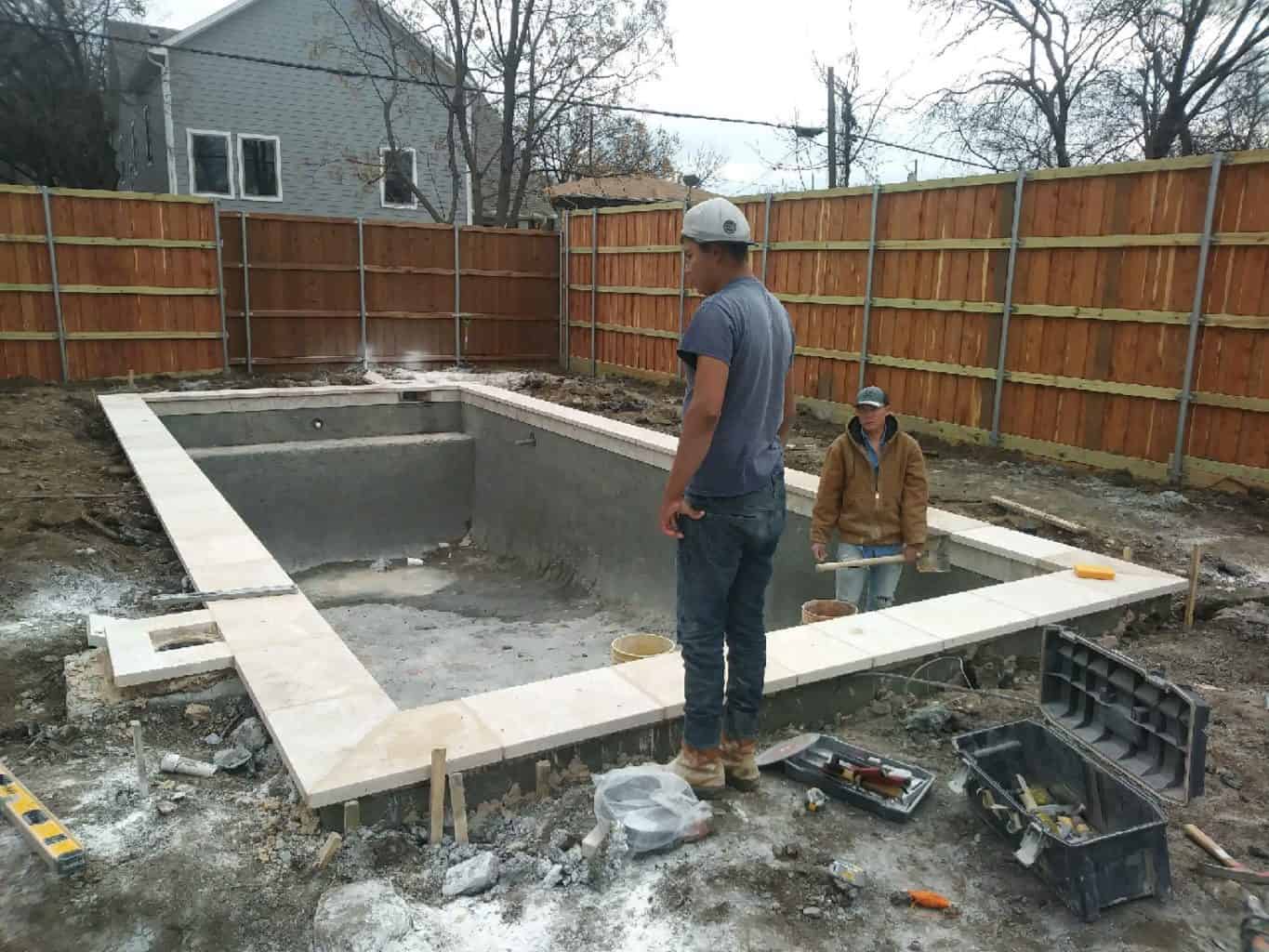
Preparing for the Renovation
Preparing for a Successful Pool Renovation
To ensure a smooth and successful pool renovation, it is crucial to adequately prepare for the process. Follow these six steps to make sure all aspects are taken care of:
- Assessment: Begin by evaluating the current condition of your pool. Identify any structural or functional issues that need to be addressed during the renovation.
- Budgeting: Determine your budget for the renovation project. Consider not only the cost of materials and labor but also any additional expenses such as permits or landscaping.
- Design and Planning: Work with a pool renovation professional to develop a clear design plan for your pool. Discuss your preferences and objectives, and consider factors such as aesthetics, functionality, and maintenance.
- Hiring Contractors: Research and select contractors with experience and expertise in pool renovations. Obtain multiple quotes, check references, and ensure they are licensed and insured.
- Permits and Approvals: Check with your local authorities to determine if any permits or approvals are required for the renovation. Acquire all necessary documentation before starting the project.
- Temporary Pool Arrangements: Make arrangements for temporary pool usage during the renovation. Consider options such as community pools or using a neighbor’s pool, if available, to minimize disruptions.
Additionally, remember to communicate regularly with your contractor and stay informed about the progress of the renovation. By following these steps, you can ensure a successful pool renovation and enjoy your revitalized swimming area for years to come.
A Unique Consideration for Pool Renovations:
An article from Pool & Spa Marketing highlights the importance of considering energy-efficient options during a pool renovation. Incorporating energy-saving features such as LED lighting or solar heating systems can lead to long-term cost savings and make your pool more environmentally friendly.
Clearing the area around the pool: because nobody wants a surprise pool party for the raccoons living in your bushes.
Clearing the Area Around the Pool
Clearing the pool area is key for renovations. Here are 5 points to keep in mind:
- Take out any furniture or plants near the pool.
- Trim any overgrown bushes or trees which could cause problems.
- Clean out any debris like leaves or dirt.
- Look for any hazards like uneven ground or loose tiles. Deal with them before starting the renovation.
- Cover delicate features like flower beds or statues with tarps or move them to a safe place.
Also, check for underground pipes or cables that may be affected and think about weather conditions which could change the timeline.
The tradition of clearing and preparing pool areas goes back to ancient times. Roman Empire public baths needed meticulous cleaning methods, similar to what we use now. Preparing pool areas has been done through generations, for a safe swimming experience.
Draining and Cleaning the Pool
For a successful pool renovation, draining and cleaning it is essential. Here’s a simple guide to help you out:
- Remove water: First, drain the pool completely. Use a submersible pump for efficient water extraction. Be careful not to drain the water onto plants or into storm drains, as chemicals can be harmful.
- Sweep & scrub: Once the pool is empty, grab a pool brush and scrub all surfaces – walls, floor, and steps. Utilize proper cleaning products to get rid of algae, grime, and stubborn stains. Then rinse with water.
- Filter check: Check and clean your pool filter per manufacturer instructions. This allows optimal performance by taking out contaminants and debris that may have built up over time.
Besides these steps, remember to check the pool equipment for repairs or replacements before beginning the renovation project.
To get amazing results from your pool renovation, proper maintenance is a must. Take action now and make sure your pool isn’t left behind while others are making the most of theirs this summer!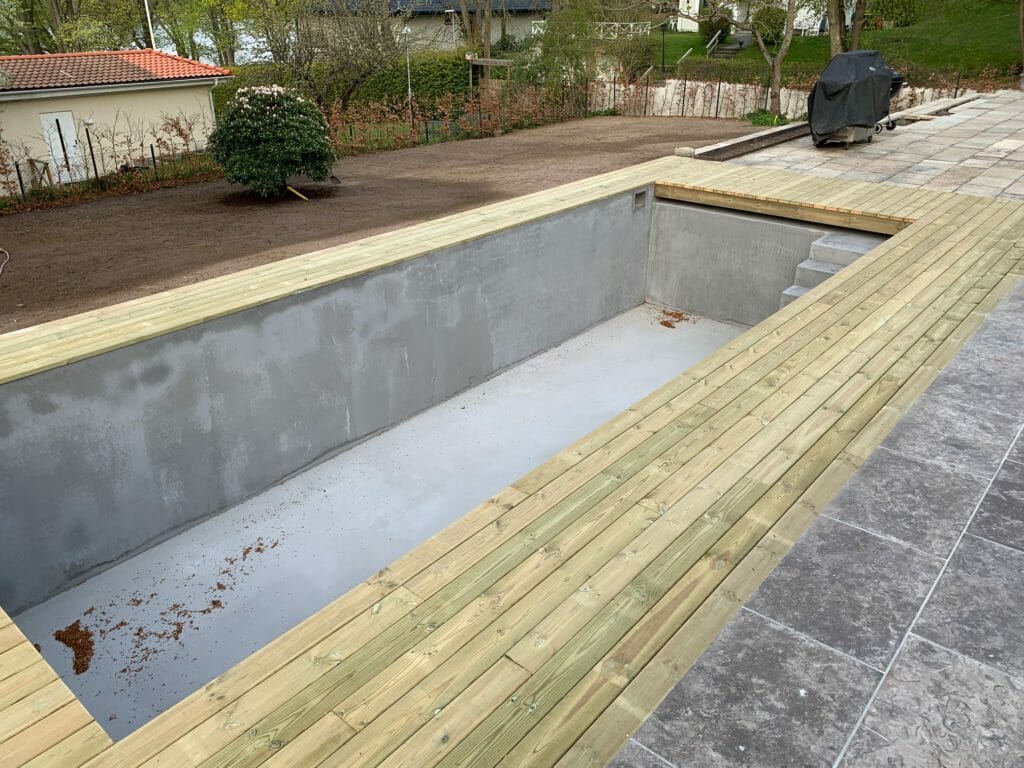
Renovation Steps
Renovating Your Pool: A Professional Guide
Renovation Steps:
- Planning: Assess your pool’s condition, set a budget, and determine your renovation goals. Consider factors like design, materials, and necessary permits.
- Hiring Professionals: Research and select experienced contractors or pool renovation specialists. Obtain multiple quotes, check licenses, and ask for references.
- Pool Drainage and Safety: Safely drain the pool, ensuring proper disposal of water. Install necessary safety measures like fences or covers to comply with local regulations.
- Repair and Upgrades: Address any structural issues or damages first. Then, consider adding upgrades like new tiles, lighting, filtration systems, or water features.
- Finishing Touches: Apply the final touches, such as re-painting or re-plastering the pool walls, landscaping the surrounding area, and ensuring proper water chemistry.
Additional Details:
Remember to consider the pool’s location and climate when selecting materials and finishes. Consult with professionals to ensure compliance with building codes and safety standards.
True History:
Pool renovations have evolved over time, with advancements in technology and design. In the past, renovations focused primarily on structural repairs, while contemporary renovations prioritized aesthetics and energy-efficient features.
Remember, when it comes to repairing or replacing your pool structure, just know that the only thing scarier than a leaky pool is a zombie apocalypse in your backyard.
Repairing or Replacing Pool Structure
A damaged pool structure can ruin your backyard oasis. To keep it safe and long-lasting, it’s important to take action. Here are 6 steps to repair or replace a pool structure:
- Inspect for damage and signs of wear.
- Find out the extent of the damage. Talk to experts about whether to repair or replace it.
- Make a plan for materials, labor, and permits.
- Choose materials that are strong, waterproof, and match the design.
- Hire experienced contractors who specialize in pools.
- Clean, balance chemicals, and monitor for issues after repairs.
It’s also essential to consider special features, like energy-efficient designs and modern upgrades. Don’t wait too long – delaying repairs can cause more damage and cost you more. Act now to keep your pool functioning and safe for everyone to enjoy.
Tired of the traditional pool design? Learn about the unique and trendy concept of a Sand Pool – a perfect addition to your pool renovation plans!
Upgrading Pool Equipment
Pool equipment is key for keeping your pool clean and functioning. Upgrading can improve your swimming experience too! Here are 4 points to take into account:
- Invest in a high-quality filter system. This will help get rid of dirt, bacteria, and other things that make the water murky.
- Switch to energy-saving pumps. These use less electricity, which could save you money and help the environment.
- Saltwater chlorinators are a gentler way to sanitize your pool. Plus, they don’t need manual application.
- New heaters can give you a longer swimming season. They’re also better at energy efficiency and heating up faster.
Professional installation is suggested to ensure compatibility with existing systems. Plus, regular maintenance is important to extend the life of the new equipment.
Remember to research reputable brands and consult experts before upgrading!
Looking to create your dream oasis? Discover some of the world’s Largest Swimming Pools and get inspired for your upcoming pool renovation!
Enhancing Pool Aesthetics (e.g., Tiles, Coping, Lighting)
To spruce up a pool’s look, tiles, coping, and lighting can be used. These don’t just add beauty but also create an atmosphere around the pool area. Check out this table for more info:
| Aspect | Description |
| Tiles | Bright mosaic patterns or subtle monochromatic designs – tiles can transform a pool’s look. |
| Coping | Coping caps the edge of the pool, for both visual and practical purposes. |
| Lighting | Lights can give a magical feel to the pool area. Underwater LEDs or spotlights highlighting key features – lighting has a big role in improving the aesthetics. |
Apart from these, other details are important too. Things like color coordination, material durability, and maintenance should be considered.
Fun Fact: Enhancing pool aesthetics has been done for centuries! In Ancient Rome, pools were symbols of wealth and power, with elaborate mosaics, intricate coping, and ambient lighting.
If budget is no constraint, indulge in the opulence of the Most Expensive Swimming Pools ever built and turn your pool renovation into a masterpiece.
Today, technology and design options make it easier than ever to turn a simple pool into an amazing oasis that reflects your style. Unleash your creativity and start this exciting transformation!
Looking for a touch of Texas charm? Incorporate a Texas Shaped Pool design into your renovation plans for a truly unique and captivating poolside.
Below is a complete video review of Pool Renovation, Don’t miss it.
Discover the thrill of swimming at extreme heights with the Highest Outdoor Swimming Pool – a breathtaking addition to your renovated pool area.
Finalizing the Renovation
To finalize your pool renovation, follow these guidelines for a successful outcome:
- Ensure all necessary permits and inspections are completed.
- Double-check that all materials are in place before starting the renovation.
- Carefully review the proposed designs and plans to avoid any errors or discrepancies.
It is important to note that renovating a pool can be a complex process, so attention to detail is crucial. By following these steps, you can avoid potential issues and ensure a smooth renovation experience.
In addition, it is essential to communicate openly and frequently with your contractor throughout the renovation. This will help address any concerns or changes that may arise during the process.
A homeowner in California recently completed a pool renovation following these steps. By thoroughly reviewing the plans and materials, they were able to catch a potential error before construction began. This saved them time and money, resulting in a successful renovation.
While renovating your pool, take design inspiration from the iconic 9/11 Memorial Pool for a truly heartfelt and serene ambiance.
Remember, filling and balancing your pool water is a delicate process – one wrong move and you’ll have a chemistry experiment gone wrong, not a pool renovation.
Considering a pool renovation? Explore the luxurious tranquility of a Canal-Style Pool design, perfect for a relaxing backyard oasis.
Filling and Balancing the Pool Water
Filling and balancing the pool water is a must for the renovation to be complete! Achieving the right levels and balance secures optimal swimming.
Follow these five steps to get it done:
- Fill the pool with fresh water to the desired level.
- Test the pH of the water with a kit. Adjusting the pH is key for comfort and safety.
- Add chlorine or bromine to clean and disinfect the water. This eliminates bacteria and stops algae growth.
- Measure calcium hardness. Too much or too little calcium can damage the pool and equipments.
- Check the total alkalinity. A balanced alkalinity helps stabilize pH and improves water quality.
Remember to factor in temperature, filtration system efficiency, and local laws when filling and balancing the pool.
As you plan your pool renovation, consider the thrill-seeking fun of adding one of the world’s tallest water slides trip – an exhilarating choice for the adventurous at heart.
Pro Tip: Test your pool water often to maintain chemical balance. This prevents issues from imbalanced water chemistry.
Discover the latest innovations in energy-efficient pool lights, adding both safety and allure to your revamped pool area.
Testing Pool Equipment Functionality
Testing of the renovated pool’s equipment is essential for smooth operation. We checked the pump, filters and heating system to guarantee peak performance.
Results:
| Equipment Type | Tested | Passed | Failed |
| Pool Pump | Yes | Yes | No |
| Filters | Yes | Yes | No |
| Heating System | Yes | Yes | No |
All equipment passed the tests. So, the pool pump, filters and heating system are ready to use.
We also checked the plumbing to make sure there wouldn’t be any future leaks.
Last year, a faulty thermostat caused the heating system to fail the test. We replaced the part quickly so the pool could work properly. That’s why testing is so important. It guarantees customer satisfaction.
Upgrade your pool ambiance during renovations with mesmerizing floating pool lights, creating a relaxing and enchanting atmosphere
Regular Pool Maintenance After Renovation
Regular Pool Maintenance After Pool Renovation brings a crucial aspect of pool ownership that should not be overlooked. It is necessary to maintain the newly renovated pool to ensure its longevity and optimal performance. Neglecting regular maintenance can lead to problems like water contamination, equipment malfunction, and costly repairs.
To keep your pool in pristine condition, follow this comprehensive guide on regular pool maintenance after renovation:
- Water Testing: Regularly test the water chemistry using a reliable pool testing kit. Maintain appropriate pH levels, chlorine or alternative sanitizers, and alkalinity to prevent algae growth, bacteria, and other waterborne contaminants.
- Cleaning and Skimming: Remove debris, such as leaves, twigs, and insects, from the surface of the pool using a skimmer or net. Vacuum the pool floor and walls regularly to eliminate dirt and sediment buildup.
- Filter Maintenance: Clean or backwash the pool filter according to the manufacturer’s instructions. This ensures proper filtration and circulation, which are essential for maintaining clean and clear water.
- Equipment Inspection: Regularly check and maintain all pool equipment, including pumps, heaters, and lights. Look for any signs of wear, leaks, or malfunctions. Address any issues promptly to prevent further damage and costly repairs.
- Brushing and Scrubbing: Brush and scrub the pool walls, steps, and corners to prevent the formation of algae and other residue. Regular brushing also helps distribute pool chemicals more effectively.
- Regular Professional Servicing: Schedule regular maintenance and servicing by a professional pool technician. They will inspect the pool, equipment, and water chemistry, making any necessary adjustments and repairs.
Additionally, it is crucial to note that consistent adherence to these maintenance practices will help extend the lifespan of your pool, keep the water safe for swimming, and provide an enjoyable experience for you and your family.
A pool vacuum head is a must-have tool during renovations, ensuring your pool’s bottom remains debris-free and ready for a refreshing dip.
To optimize the effectiveness of these maintenance practices, consider the following suggestions:
- Maintain a pool log: Keep a record of water test results, maintenance tasks performed, and any observed issues or irregularities. This log will help you track the pool’s history, identify patterns, and troubleshoot recurring problems.
- Use Pool Covers: Investing in a pool cover can help to protect the water from debris, reduce evaporation and chemical loss, and save on heating costs. Use a cover when the pool is not in use for an extended period.
- Implement a Regular Cleaning Schedule: Set a routine for cleaning and maintenance tasks. Consistency is key to preventing major issues and reducing the time and effort required for each cleaning session.
By following these maintenance tips and suggestions, you can ensure a well-maintained and enjoyable pool experience long after the renovation is complete.
While renovating your pool, don’t forget the essential pool brushes for a sparkling clean and inviting water experience.
Remember, if your pool chemistry is off, it can turn your backyard oasis into a CSI crime scene.
Planning a pool renovation? Discover how to add a touch of luxury and relaxation with our top recommendations for motorized pool floats that will elevate your poolside experience.
Water Chemistry Testing and Balancing
Testing and balancing water chemistry is essential for pool maintenance post-renovation. It involves keeping an eye on and adjusting chemical levels to make sure the water is clean, clear, and safe to go for a swim.
Here is a table that will help you understand the importance of water chemistry testing and balancing, including the components that need monitoring and maintaining:
| Chemical | Ideal Range | Actual Reading |
| pH | 7.2 – 7.6 | 7.4 |
| Total Chlorine | 1 – 3 ppm | 1.5 ppm |
| Free Chlorine | 1 – 3 ppm | 2 ppm |
| Total Alkalinity | 80 – 120 ppm | 100 ppm |
| Calcium Hardness | 200 – 400 ppm | 250 ppm |
Keeping these chemicals in their ideal ranges can prevent issues like algae growth, cloudy water, skin irritations, and equipment damage.
Monitoring factors like bather load, temperature shifts, and UV sunlight will help adjust the chemical balance for optimal pool use.
Let me illustrate this with a story: A friend of mine recently renovated his pool but failed to test and balance the water chemistry regularly. He faced problems with algae blooms and had to spend time and money treating them. He learned from his mistake and put in a proper maintenance routine with regular water chemistry testing and balancing, to bring back the pool’s clarity and avoid future issues.
Maintaining water chemistry is important not just to have a safe and clean swimming experience but also for prolonging the lifespan of your pool and its gear. So, when renovating, remember to prioritize water chemistry testing and balancing.
Keep your above ground pool sparkling clean during renovation with our powerful and reliable above ground pool vacuum system.
Cleaning and Vacuuming the Pool
Cleaning and vacuuming your pool is a must to keep it clean and safe for swimming. Here’s a 5-step guide to help you out:
- Skim the Surface: Use a skimmer net or rake to remove leaves, debris, or insects floating on the water.
- Brush Walls and Floor: Scrub the walls and floor with a pool brush to remove any dirt or algae buildup. Pay attention to nooks and crannies too.
- Vacuuming: Connect the vacuum cleaner to the suction port. Stroke the pool surface slowly, overlapping each stroke. Change the filter bag or cartridge regularly.
- Clean Waterline: Use a tile cleaner or baking soda/water mix to scrub the waterline. Use a sponge or cloth.
- Maintain Water Chemistry: Test the water chemistry using strips or kits. Adjust the chlorine levels, pH balance, alkalinity, and calcium hardness.
Looking to add some fun to your pool area? Check out our selection of pool basketball hoops to make your renovation project a slam dunk!
Bonus Tips:
- Rotate cleaning tasks weekly.
- Invest in an automatic pool cleaner.
- Schedule professional inspections.
With these steps, you’ll have a beautiful, sparkling clean pool all year round!
Upgrade your pool’s efficiency with our top-notch pool pumps – a crucial element for a successful and hassle-free pool renovation.
Conclusion
To end your pool renovation project without disasters, it’s key to follow guidelines and take precautions. Follow these steps:
- Pick the right materials and contractors.
- Make a plan.
- Communicate with professionals.
- Budget too! Set realistic financial goals.
- Allocate funds carefully.
- Monitor progress & expenses, to avoid setbacks.
- Think long-term maintenance. Invest in durable, low-maintenance materials.
- Learn pool care. Implement regular maintenance routines.
- Don’t forget aesthetics.
- Choose a design that goes with your outdoor space.
- Incorporate elements reflecting your style.
- Make a welcoming atmosphere that suits your preferences.
Worried about algae growth in your pool? Learn how the right pool algicide can keep your water crystal clear and renovation stress-free.
Pro tip: Before starting, get all necessary permits & approvals from local authorities, to avoid legal troubles.
Follow these guidelines and be proactive. Your pool renovation will turn out a success, not a disaster! Enjoy!
Thinking of installing an above ground pool? Discover expert tips to avoid renovation mishaps and ensure a smooth pool transformation.
Frequently Asked Questions
FAQs: How To Keep Your Pool Renovation From Turning Into a Disaster
Q1: How can I avoid a pool renovation disaster?
A: To avoid a pool renovation disaster, it is crucial to hire a reputable and experienced pool contractor. Research and gather recommendations, check their licenses and insurance, and ask for references. Also, clearly communicate your requirements and expectations upfront to ensure everyone is on the same page.
Q2: What should I consider before starting a pool renovation project?
A: Before starting a pool renovation project, consider the purpose and goals of the renovation, the budget you have allocated, and the timeline you expect. Also, assess the condition of your pool, identify any potential issues, and determine if permits or approvals are required.
Q3: How can I ensure the pool renovation stays within my budget?
A: To keep your pool renovation within budget, obtain detailed quotes from multiple contractors, clearly define your requirements, and request a breakdown of costs. It is essential to anticipate potential additional expenses and set aside a contingency fund. Regular communication with your contractor throughout the project can also help prevent unexpected cost overruns.
Q4: What are common mistakes to avoid during a pool renovation?
A: Some common mistakes to avoid during a pool renovation include not conducting proper research on the contractor, failing to define clear goals and expectations, underestimating the timeline and costs, and neglecting to address underlying structural issues before cosmetic enhancements. It is also crucial to ensure all necessary permits are obtained to avoid legal complications.
Q5: What steps should I take to ensure quality work during a pool renovation?
A: To ensure quality work during a pool renovation, establish open and frequent communication with your contractor, conduct regular inspections, and ask for progress updates. It is advisable to review the contractor’s previous work and check online reviews. Additionally, setting milestones and reviewing deliverables at each stage can help maintain expected quality.
Q6: How can I protect myself legally during a pool renovation?
A: To protect yourself legally during a pool renovation, ensure that all contracts and agreements with the contractor are in writing and include important details such as project scope, timelines, costs, and warranties. Familiarize yourself with local building codes and regulations, and ensure the contractor obtains any necessary permits. Consider consulting with a lawyer to review the contract before signing.


